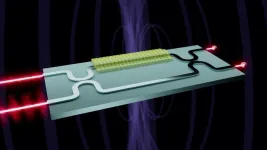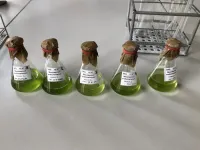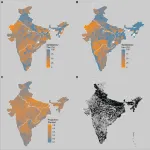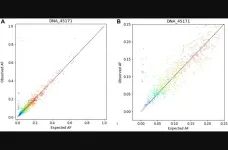(Press-News.org) New research published in the New England Journal of Medicine indicates that stem cell gene therapy may offer a promising, curative treatment for the painful, inherited blood disorder sickle cell disease (SCD).
The findings from a new clinical trial, published August 31, add to the body of evidence supporting gene therapy as a treatment for sickle cell disease, which primarily impacts people of color.
About 100,000 Americans have sickle cell disease, according to the U.S. Centers for Disease Control and Prevention. The condition, which can cause a lifetime of pain, health complications and expenses, affects one in 365 Black babies born in the U.S. and one in 16,300 Hispanic babies.
Until recently, the only treatment options have been intensive bone marrow transplants from siblings or matched donors. But other curative therapies are now on the horizon. The University of Chicago Medicine Comer Children’s Hospital was one of three sites to enroll patients in the clinical trial, which tested a stem cell gene therapy to treat sickle cell disease.
As part of the trial, researchers used CRISPR-Cas9 to edit specific genes in stem cells — the building blocks of blood cells — taken from each patient. The edits increased the cells’ production of fetal hemoglobin (HbF), a protein that can replace unhealthy, sickled hemoglobin in the blood and protect against the complications of sickle cell disease. The patients then received their own edited cells as therapeutic infusions.
The therapy was the second for this disease to use CRISPR-Cas9 technology and the first to target a new genetic area and use cryopreserved stem cells with the hope of increasing access to such a treatment. Other gene therapy studies for SCD have used lentiviruses — a type of virus often modified and used for gene editing which remain in the cell long-term. No foreign material remains in stem cells edited with CRISPR-Cas9.
Trial participants who received the CRISPR-edited stem cells reported a decrease in vaso-occlusive events, a painful phenomenon that occurs when sickled red blood cells accumulate and cause a blockage.
“The biggest take-home message is that there are now more potentially curative therapies for sickle cell disease than ever before that lie outside of using someone else’s stem cells, which can bring a host of other complications,” said James LaBelle, MD, PhD, director of the Pediatric Stem Cell and Cellular Therapy Program at UChicago Medicine and Comer Children’s Hospital and senior author of the study. “Especially in the last 10 years, we’ve learned about what to do and what not to do when treating these patients. There’s been a great deal of effort towards offering patients different types of transplants with decreased toxicities, and now gene therapy rounds out the set of available treatments, so every patient with sickle cell disease can get some sort of curative therapy if needed. At UChicago Medicine, we’ve built infrastructure to support new approaches to sickle cell disease treatment and to bring additional gene therapies for other diseases.”
As the scientific community continues to refine and expand the applications of gene therapy, the potential for curative treatments for diseases like sickle cell disease is becoming more of a transformative reality. The journey is ongoing, with the need for long-term follow-up and further research, but this study provides an encouraging glimpse into a future of effective genetic interventions.
In the larger context of therapeutic development, LaBelle stressed the importance of the study's contribution to the growing body of evidence supporting the viability of gene therapy as a treatment for sickle cell disease. Two other gene therapies for the disease are awaiting FDA approval this year.
“The data from this trial supports bringing on similar gene therapies for sickle cell disease and for other bone marrow-derived diseases. If we didn't have this data, those wouldn't move forward,” he said.
The study, “CRISPR-Cas9 Editing of the HBG1/HBG2 Promoters to Treat Sickle Cell Disease,” was published in NEJM in August 2023. Co-authors include Radhika Peddinti, along with researchers from St. Jude Children’s Research Hospital, Memorial Sloan Kettering Cancer Center, Novartis Institutes for BioMedical Research, Children’s Hospital Los Angeles, and IRCCS San Raffaele Hospital in Milan, Italy. The authors also acknowledged research coordinator Christopher Omahen and Amittha Wickrema, director of UChicago's cell processing facility.
END
New study shows promising evidence for sickle cell gene therapy
2023-08-30
ELSE PRESS RELEASES FROM THIS DATE:
UC Santa Barbara quantum scientists to conduct NSF-funded research to pursue quantum-scale sensor technologies
2023-08-30
At the atomic and subatomic scales exist behaviors that have vast potential to enhance how we see and interact with the world, by improving current technologies and potentially giving rise to new ones. The main advantage to be gained from the realm of quantum sensing is its extreme sensitivity and accuracy, able to capture the faintest of signals and measure at the smallest of scales.
Now, several UC Santa Barbara researchers are poised to deploy their expertise in quantum science as part of the U.S. National Science Foundation’s (NSF) program ...
Illinois professor examines the overlooked role of food in civil rights struggle
2023-08-30
CHAMPAIGN, Ill. — Food was used as both a weapon and a tool of resistance in the Mississippi Delta during the Civil Rights Movement.
Bobby J. Smith II, an African American studies professor at the University of Illinois Urbana-Champaign, looked at how the Civil Rights Movement expanded to include struggles around food in his book “Food Power Politics: The Food Story of the Mississippi Civil Rights Movement.” The book is the inaugural title in the Black Food Justice series by the University of North Carolina Press.
Smith wrote about how white ...
How nutrition guidance can optimize fertility treatments for female cancer survivors
2023-08-30
A cancer diagnosis can increase the risk of infertility in young women. While consuming a healthy diet – including whole grains, fruits, vegetables, and healthy fatty acids – has been found to improve both fertility and cancer survivorship, over 90% of young adult cancer survivors don’t meet the dietary recommendations and have diets consisting of high fat and low fruit and vegetable intake. Researchers from Drexel University’s College of Nursing and Health Professions explored the barriers and ways to promote healthy diet practices among female cancer survivors with fertility challenges.
Recently ...
Algae provide clues about 600 million years of plant evolution
2023-08-30
The Earth's surface is covered by plants. They make up the majority of biomass on land and exhibit a wide range of diversity, from mosses to trees. This astounding biodiversity came into existence due to a fateful evolutionary event that happened just once: plant terrestrialization. This describes the point where one group of algae, whose modern descendants can still be studied in the lab, evolved into plants and invaded land around the world. An international group of researchers, spearheaded by a team from the University of Göttingen, generated large ...
Editorial: Epigenetic aging in oocytes
2023-08-30
“In summary, our group demonstrates basic principles in the early aging of mammalian oocytes.”
BUFFALO, NY- August 30, 2023 – A new editorial paper was published in Aging (listed by MEDLINE/PubMed as "Aging (Albany NY)" and "Aging-US" by Web of Science) Volume 15, Issue 15, entitled, “Epigenetic aging in oocytes.”
Aging-related phenotypes span many different tissues and cell types, and start to occur at different ages - a different typical age for every cell type. In their new editorial, researchers Peera Wasserzug-Pash and Michael ...
Can taking statins after a bleeding stroke lower risk of another stroke?
2023-08-30
MINNEAPOLIS – People who have had a stroke called an intracerebral hemorrhage who take cholesterol-lowering drugs called statins may have a lower risk of having another stroke, especially ischemic stroke, compared to people who also had an intracerebral hemorrhage but were not taking statins, according to a new study published in the August 30, 2023, online issue of Neurology®, the medical journal of the American Academy of Neurology.
Intracerebral hemorrhage is caused by bleeding in the brain. Ischemic stroke is caused by a blockage of blood flow to the brain and is the most common type of stroke.
“Previous research has had mixed results on the risk of ...
Stanford-led study reveals way to help prevent childhood stunting
2023-08-30
A relatively small intervention could have a huge impact on a damaging condition that stalks children in the developing world. A new Stanford-led study shows that adding zinc to farmland soil can help prevent childhood stunting, a condition due to chronic undernutrition that is associated with poor brain development and long-lasting harmful consequences, such as reduced school performance and increased disease risks. The paper, published Aug. 21 in Scientific Reports is the first large-scale study to examine the association between children’s nutritional status or health outcomes and soil mineral availability in India, ...
Validation of a comprehensive genomic profiling assay: NeXT Dx™
2023-08-30
“NeXT Dx incorporates a range of features and comprehensive genome variant detection methods that lead to improved disease management and possible enhanced clinical utility.”
BUFFALO, NY- August 30, 2023 – A new research paper was published in Oncotarget's Volume 14 on August 30, 2023, entitled, “Analytic validation of NeXT Dx™, a comprehensive genomic profiling assay.”
In this new research paper, researchers Juan-Sebastian Saldivar, Jason Harris, Erin Ayash, Manqing Hong, Prateek Tandon, Saloni Sinha, Patricia Miranda Hebron, Erin E. Houghton, ...
UC Davis names Blake Meyers as new Genome Center director
2023-08-30
Blake Meyers, a principal investigator at the Donald Danforth Plant Science Center and a professor of plant sciences from the University of Missouri - Columbia, has been named the new director and Novozymes Chair in Genomics at the UC Davis Genome Center. Meyers, who studies plant RNA biology, bioinformatics and functional genomics, will step into the role on March 1.
A member of the National Academy of Sciences, Meyers succeeds the center’s founding director Richard Michelmore, a distinguished professor in the departments of Plant Sciences, Molecular and Cellular Biology, and Medical Microbiology and Immunology.
Roots ...
NASA to demonstrate laser communications from space station
2023-08-30
NASA uses the International Space Station — a football field-sized spacecraft orbiting Earth — to learn more about living and working in space. For over 20 years, the space station has provided a unique platform for investigation and research in areas like biology, technology, agriculture, and more. It serves as a home for astronauts conducting experiments, including advancing NASA’s space communications capabilities.
In 2023, NASA is sending a technology demonstration known as the Integrated LCRD Low Earth Orbit User ...







